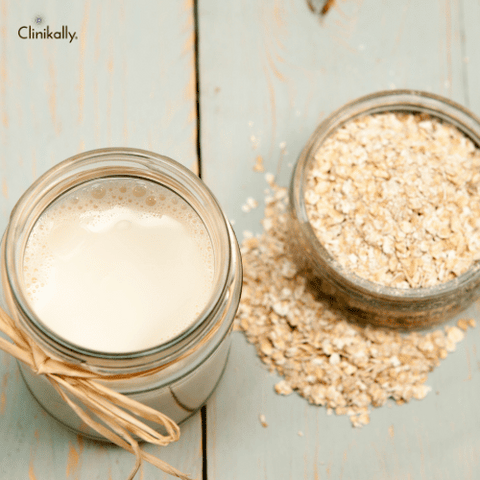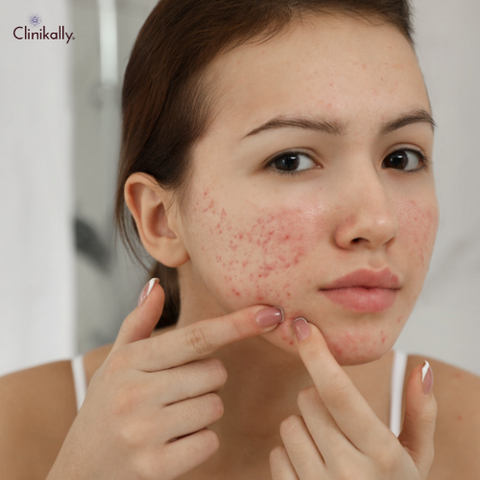Acne is a prevalent skin condition that affects individuals of all ages and genders. It is characterized by the development of pimples, blackheads, whiteheads, and other blemishes, and can range from mild to severe. While the causes of acne are multifactorial, research has suggested that diet may play a role in its development. In particular, the relationship between dairy consumption and acne has been a topic of ongoing debate and investigation, with some studies suggesting a link between the two.
Cystic acne, in particular, is a severe form of acne that is characterized by deep, painful cysts that can leave scars. This type of acne can be challenging to treat and can have a significant impact on a person's self-esteem and quality of life. Understanding the causes of cystic acne is essential in effectively managing this condition.
In this blog, we will explore the truth about the connection between dairy and cystic acne, as well as other factors that contribute to the development of acne, such as genetics, hormones, and lifestyle habits. We will also discuss various treatment options for acne, including topical and oral medications, dietary changes, and skincare practices. By examining the latest research and evidence-based approaches, we hope to provide readers with a comprehensive understanding of acne and its management.
Understanding the Causes of Acne
Acne is a common skin condition that affects millions of people around the world. It occurs when the hair follicles on the skin become clogged with oil and dead skin cells, leading to the development of pimples, blackheads, whiteheads, and other blemishes. While acne is not a life-threatening condition, it can have a significant impact on a person's self-esteem and quality of life. To effectively treat and manage acne, it is important to understand the causes behind it. In this section, we will delve into the various factors that contribute to the development of acne, including genetics, hormones, lifestyle factors, and skincare habits.
Types of Acne
There are several types of acne, each with its unique characteristics. Some common types include:
-
Cystic acne: Severe, painful, and inflamed acne that forms deep within the skin.
-
Hormonal acne: Acne caused by fluctuations in hormone levels, typically occurring around puberty, menstruation, and pregnancy.
-
Inflammatory acne: Red and swollen acne lesions, such as papules, pustules, and nodules.
Factors that Contribute to Acne
Various factors can contribute to acne, including:
-
Genetics: A family history of acne increases one's likelihood of developing the condition.
-
Hormones: Fluctuations in hormone levels, particularly androgens, can increase sebum production and contribute to acne.
-
Bacteria: The overgrowth of bacteria, such as Propionibacterium acnes (P. acnes), can lead to inflammation and acne.
-
Diet: Certain dietary factors, such as dairy and high-glycaemic foods, have been linked to acne.
The Link Between Dairy and Acne

Acne is a common skin condition that affects millions of people around the world. While the causes of acne are multifactorial, research has suggested that diet may play a role in its development. In particular, some studies have explored the link between dairy consumption and acne. Dairy products are a staple in many people's diets, but they contain hormones and other compounds that can affect the skin. In this section, we will examine the evidence surrounding the connection between dairy and acne, as well as explore potential mechanisms that may explain this association.
What the Research Says
Research on the connection between dairy consumption and acne has produced mixed results. Some studies suggest that dairy, particularly skim milk, can increase the risk of acne due to its high levels of hormones, such as insulin-like growth factor 1 (IGF-1) and insulin, which can exacerbate acne. However, other studies have found no significant association between dairy and acne.
Hormonal and Inflammatory Acne
Dairy consumption may be linked to hormonal and inflammatory acne due to the presence of hormones and bioactive molecules in dairy products. These substances can increase sebum production and inflammation, contributing to the development of acne.
Diet and Acne Treatment

Acne is a prevalent skin condition that affects many individuals, and its severity can range from mild to severe. While there are various treatments available to manage acne, such as topical creams, antibiotics, and isotretinoin, dietary changes have been explored as a potential complementary approach to acne treatment. Research suggests that certain foods may exacerbate acne, while others may help to improve it. In this section, we will examine the relationship between diet and acne, as well as explore specific foods that may be beneficial or detrimental for those with acne-prone skin. Additionally, we will discuss dietary guidelines that may aid in the management of acne, and how they can be incorporated into an overall treatment plan.
Dairy Alternatives for Acne-Prone Skin
If you suspect that dairy is contributing to your acne, consider trying dairy alternatives, such as:
-
Almond milk
-
Soy milk
-
Coconut milk
-
Oat milk
-
Rice milk
These alternatives can provide similar taste and texture to dairy products without the potentially acne-triggering hormones.
The Benefits of a Plant-Based Diet for Acne
A plant-based diet, including veganism, can offer numerous benefits for acne-prone skin. This type of diet often includes:
-
Lower levels of saturated fat and cholesterol, which can reduce inflammation.
-
Higher levels of antioxidants, which can protect the skin from oxidative stress.
-
Increased consumption of fiber, which can help regulate blood sugar levels and reduce acne-causing inflammation.
Probiotics, Antioxidants, and Other Nutrients for Acne
Certain nutrients have been shown to support skin health and help manage acne:
-
Probiotics: Beneficial bacteria that can help balance the gut microbiome and reduce inflammation.
-
Antioxidants: Compounds that protect the skin from oxidative stress, such as vitamins A, C, and E.
-
Zinc: An essential mineral that helps regulate sebum production and has anti-inflammatory properties.
-
Omega-3 fatty acids: Healthy fats that can reduce inflammation and support skin health.
Low-Glycaemic Index and Gluten-Free Diets for Acne
Adopting a low-glycaemic index diet can help regulate blood sugar levels and reduce inflammation, which can benefit acne-prone skin. This type of diet emphasizes whole grains, fruits, vegetables, lean proteins, and healthy fats.
A gluten-free diet, which eliminates wheat, barley, and rye, may be beneficial for some individuals with acne, particularly those with a sensitivity to gluten. However, more research is needed to confirm the link between gluten and acne.
The Impact of Sugar and Stress on Acne
High sugar intake has been associated with increased inflammation and acne. Reducing sugar consumption can help manage acne and promote overall skin health. Additionally, stress can exacerbate acne by increasing cortisol levels, which can lead to increased sebum production and inflammation. Practicing stress management techniques, such as meditation, exercise, and mindfulness, can help reduce acne flare-ups.
Skincare for Acne-Prone Skin

Acne is a common skin condition that affects millions of people around the world. While there are various treatments available to manage acne, including medications and dietary changes, proper skincare practices are also essential in managing and preventing breakouts. Acne-prone skin requires a unique approach to skincare, as certain products and ingredients may aggravate the condition. In this section, we will explore the best skincare practices for those with acne-prone skin, including cleansing, exfoliating, moisturizing, and using non-comedogenic products. Additionally, we will discuss specific ingredients that are beneficial for acne-prone skin, and those that should be avoided. By following a tailored skincare routine, individuals with acne-prone skin can effectively manage their condition and promote healthy, clear skin.
Cleansing, Exfoliating, and Moisturizing
Proper skincare is crucial for managing acne:
-
Cleansing: Gently cleanse your skin twice daily with a mild, non-comedogenic cleanser to remove dirt, oil, and bacteria.
-
Exfoliating: Use a gentle exfoliant 1-2 times per week to remove dead skin cells and unclog pores.
-
Moisturizing: Choose a non-comedogenic, oil-free moisturizer to hydrate your skin without clogging pores.
Treating Acne with Topical and Oral Medications
Various treatments are available for acne, ranging from over-the-counter products to prescription medications:
-
Topical treatments: Benzoyl peroxide, salicylic acid, and retinoids can help unclog pores, reduce inflammation, and promote skin cell turnover.
-
Oral medications: Antibiotics, birth control pills, and isotretinoin may be prescribed for severe or persistent acne.
Acne Awareness and Conclusion
In conclusion, acne is a common skin condition that affects people of all ages and can have a significant impact on a person's self-esteem and quality of life. While there are various factors that contribute to the development of acne, including genetics, hormones, lifestyle factors, and skincare habits, it is important to be aware of the potential link between diet and acne. While the evidence surrounding the connection between dairy and acne remains inconclusive, it is clear that adopting a balanced diet and practicing proper skincare can help manage acne and promote healthy, clear skin.
In addition to dietary changes and skincare practices, consulting a dermatologist can be an important step in managing acne. Dermatologists can provide individualized treatment plans based on the severity and type of acne, including prescription medications and in-office treatments. By working with a dermatologist, individuals with acne can receive comprehensive care and achieve the best possible outcome.
Overall, acne awareness is essential in understanding the causes and treatment of this common skin condition. By adopting healthy lifestyle habits, practicing proper skincare, and seeking medical advice when necessary, individuals with acne can effectively manage their condition and improve their overall well-being.









































